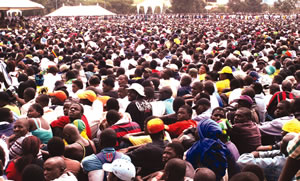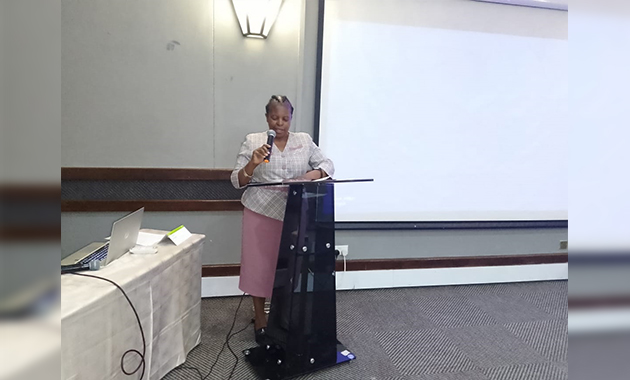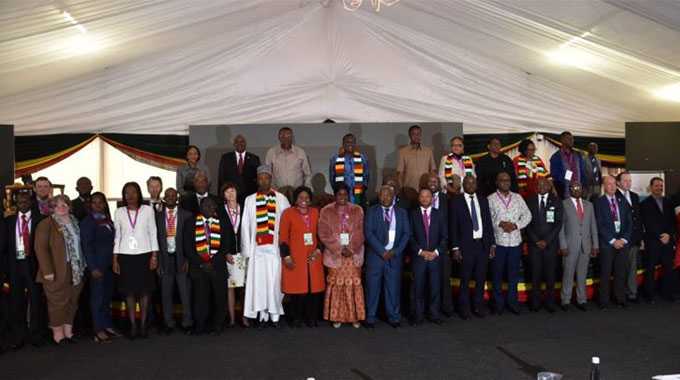Is mother language out of fashion?
with their teachers, are waiting for the hired school bus to arrive to take them to the school somewhere in the low-density suburbs.
The children, quite oblivious of the industry that is going on around them as people are working and moving about in their daily work, are engrossed in excited talk.
Talk about their mums and dads; their friends and relatives; their schoolwork and cartoons – and just anything that can interest someone aged between three and five years.
A few hop and prattle about, to the displeasure of their guides who have to keep an eye on the young ones, as something could go nasty anytime in the traffic jungle that the city is, and generally cognisant of the danger young children can be unto themselves.
So a middle-aged female teacher barks in English to a seemingly overzealous “dark” boy, whose grey uniforms look already soiled this early in the day: “Hey Tanatswa, stop what you are doing or you don’t go to school today!”
The boy immediately, and perhaps momentarily, stops the hopping about and tries to compose himself.
It is apparent that the English language with which she has delivered her threat is well understood by the young one.
But spending a while among the children and their tutors will reveal that the English language has become more than a tool of instruction.
The children speak the language, amongst themselves, with varying degrees of fluency and confidence.
And the general air around is that of a mini-foreign land where the English language is the only one permitted in discourse.
And the situation replicates itself at school, and back at the station again in the afternoon as the children wait to be taken home by their parents.
“We teach the kids in English and we encourage them to speak in English,” says one teacher who declines to be named.
“As you can see, we are moving with the times and English is the in-thing, where can you go speaking Shona or Ndebele in this globalised world?”
She says that their products are destined for elite schools where they meet with different people of differing backgrounds.
“They won’t feel alienated in the circumstances because they know how to communicate with others,” she reasons.
Some parents, like Mrs Nyaradzo Ruuke-Munetsi, The Herald caught up with this week as she accompanied her son to a similar kindergarten in Queensdale had this to say.
“You wouldn’t want your kid to appear dull and without confidence among other kids when you go to functions and so on.
“The mother language is important but for the kids to communicate the grannies and so forth and we should not lose it,” she said.
The above contradiction seems to highlight what appears to be a likely showdown between conservative and “change” elements when it comes to language and culture.
Recently, on February 21, the world marked the United Nations International Mother Language Day.
The day was proclaimed by the General Conference of the United Nations Educational, Scientific and Cultural Organisation (UNESCO) in November 1999 (30C/62).
On 16 May 2009 the United Nations General Assembly in its resolution A/RES/61/266 called upon Member States “to promote the preservation and protection of all languages used by peoples of the world”.
“By the same resolution,” says the United Nations organisation on its website, “the General Assembly proclaimed 2008 as the International Year of Languages, to promote unity in diversity and international understanding, through multilingualism and multiculturalism.”
International Mother Language Day has been observed every year since February 2000 to promote linguistic and cultural diversity and multilingualism.
The United Nations explains: “The date represents the day in 1952 when students demonstrating for recognition of their language, Bangla, as one of the two national languages of the then Pakistan, were shot and killed by police in Dhaka, the capital of what is now Bangladesh.”
It also posits: “Languages are the most powerful instruments of preserving and developing our tangible and intangible heritage.
“All moves to promote the dissemination of mother tongues will serve not only to encourage linguistic diversity and multilingual education but also to develop fuller awareness of linguistic and cultural traditions throughout the world and to inspire solidarity based on understanding, tolerance and dialogue.”
But this wisdom is being snubbed, ironically by the mothers whose language they should preserve.
One professional lady, a mother of three who stays in Hatfield believes Shona, her mother language, is a dying language.
“At least in the rigid sense,” she explains, “in the globalised world you don’t want to be a village player.”
She believes that the best way to salvage and at least ensure that the language is spoken is to revolutionarise it by adopting other elements and languages.
She also decries the fact that given the small populations that speak indigenous languages like Shona and Ndebele – Zimbabwe’s biggest languages, it was easy for them to be overwhelmed.
“If you look at these languages like English or French, everyone speaks them. The other people’s languages such as Swahili in East Africa and mandarin (in China) that are surviving is because they are backed by many people and thus hold their own,” she said.
Government has expressed discomfort at the proliferation of English in schools especially, at kindergarten level.
Says Deputy Education, Arts Sport and Culture Minister Lazarus Dokora: “Our policy is to have children being taught and instructed in their mother language up to Grade 3 except when in English lessons.
“The idea is to boost confidence in the children who should not feel intimidated by the use of another language when they are young.”
Deputy Minister Dokora said he was worried by the drilling of children, as young as three in the English language, among other tasks that should not be done at this level.
“Early Childhood Development A and B (ages 3-4, 4-5 respectively) is about building confidence, letting children draw shapes, interact with each other and help children with self organisation.
“What we are seeing in these non-governmental institutions is the opposite and is wrong.”
He fears that in the long-term children risked not only alienation from their language but also their society.
In fact academically, perhaps due to attitudes, the Shona language has been receiving low marks compared to other subjects. He says that even when children excel academically and professionally they might not be grounded in the society and therefore likely to be “mercenaries”.
Deputy Minister Dokora debunked the myth that indigenous languages are not as expressive as English or any other European language in current use.
Illustrating the power of indigenous languages, he gave the example of how the Eskimos in Northern Europe, can identify up to 12 shades of snow in their native language while English itself cannot go beyond “three or four”.
He urged parents to be wary of cultural imperialism, which negated the strength and value of local institutions, language and culture.
He said the mother language was “the intimation of intuitive thinking” and thus should be preserved.
He gave the proviso for dynamism, but was reluctant to see Zimbabwe speaking “pidgin” languages on account of losing its mother tongues, and on the other hand not being able to speak proper English.
African scholars, such as Ngugi wa Thiongo have also come out in support of indigenous languages as a buffer against European domination.
Africa recognises this need. On June 15, Africa observes the Day of the African Child, in memory of thousands of black school children who were maimed and killed in the 1976 Soweto Uprising in South Africa.
They took to the streets to protest the inferior quality of their education and to demand their right to be taught in their own language.












Comments